7 times trans people took to the streets for urgent, vital protests, in pictures

Trans supporters protest outside Netflix headquarters in Los Angeles. (Al Seib / Los Angeles Times via Getty Images).
For Transgender Awareness Week, we look back at seven times that trans and non-binary people took to the streets in the last year to fight for our rights.
From a relentlessly hostile, institutionally transphobic media in the UK, to LGBT+ centres being attacked by fascists in Bulgaria and record levels of fatal violence against trans women of colour in the US, trans and non-binary people have sadly had plenty to protest about.
And in a year that was largely dominated by the coronavirus pandemic, political incompetence on a global scale and the increasing harms and horrors of the climate crisis, trans and non-binary people have also been among the leaders of a loud, and growing, global movement for change.
Whether it’s wildfires, poverty, racism or pollution: trans and non-binary people are just as likely as cis people to be affected by the serious problems in the world. Moreover, in many places, to be trans is to be more likely to be homeless, unemployed, attacked or arrested. It’s unsurprising, then, that this past year saw trans protests erupt more frequently, more loudly, and more boldly.
Here are seven times that we took to the streets in the last year.
1. London’s biggest-ever Trans+ Pride
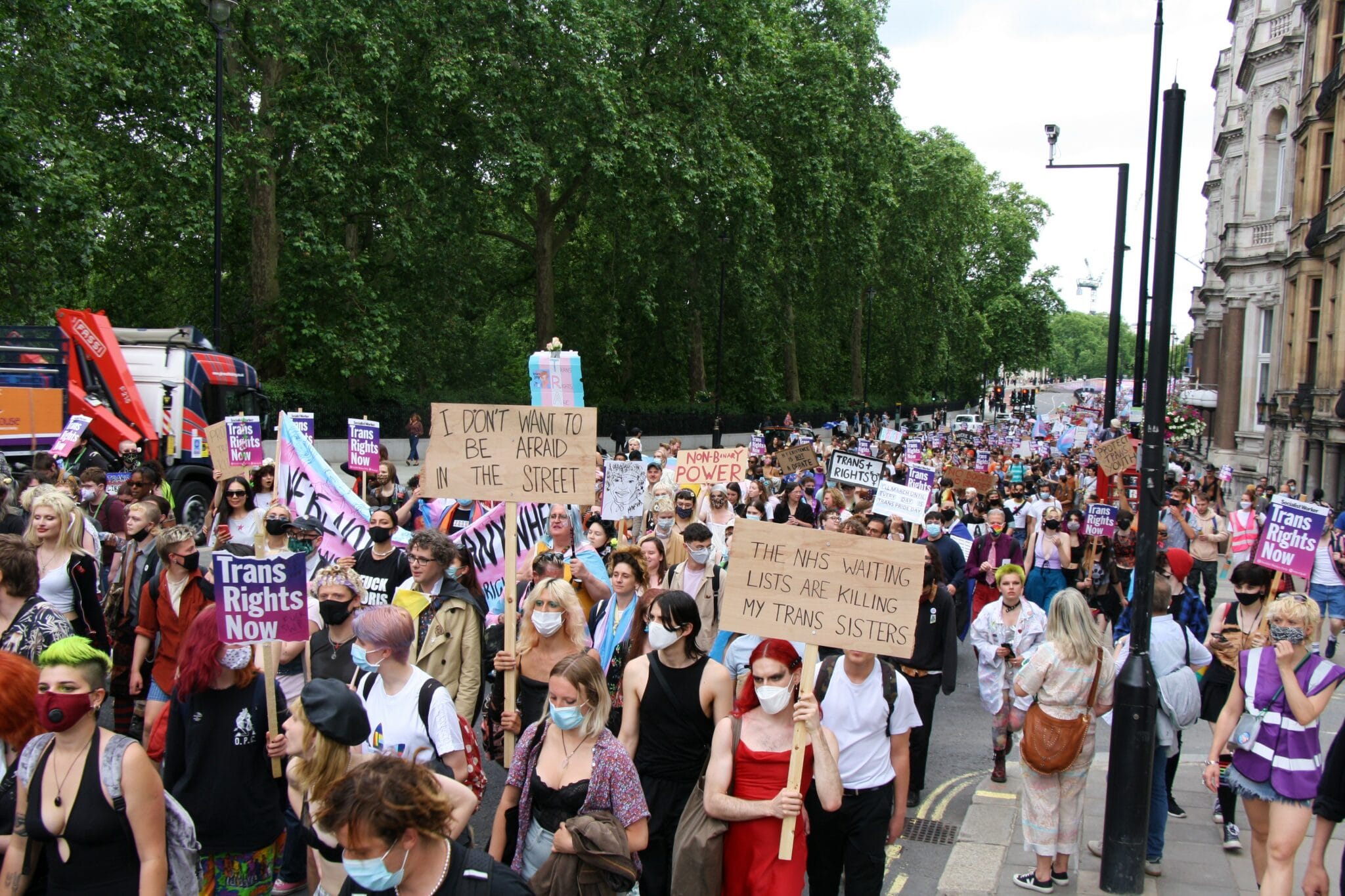
London Trans+ Pride. (PinkNews)
This year’s London Trans+ Pride was the biggest ever, with almost 10,000 people taking to the streets of central London in June to demand equal rights for the trans community, access to healthcare for trans kids and legal recognition of non-binary people.
Many carried or wore flowers, in memory of trans lives lost. Placards and banners made the demands of those gathered at Wellington Arch clear: healthcare equality, gender recognition law reform, protection of trans kids, legal recognition for non-binary people, intersex rights, improving the material conditions of trans people’s lives. There were reminders that Black Trans Lives Matter, proud proclamations of dykes for trans rights, and angry messages directed at Boris Johnson and his Tory colleagues – “Protect the kids, stop banning puberty blockers, f**k Liz Truss” read one.
After the march finished in Soho Square, non-binary, intersex Hollyoaks star Ki Griffin and model, podcaster and author Munroe Bergdorf were among those who gave powerful speeches to the assembled crowds. After a long year of attacks from the media, politicians and anti-trans campaigners, trans and non-binary people coming together for London Trans+ Pride were nourished and freshly energised by being with community.
2. Trans Netflix employees organise walkout after Dave Chappelle special
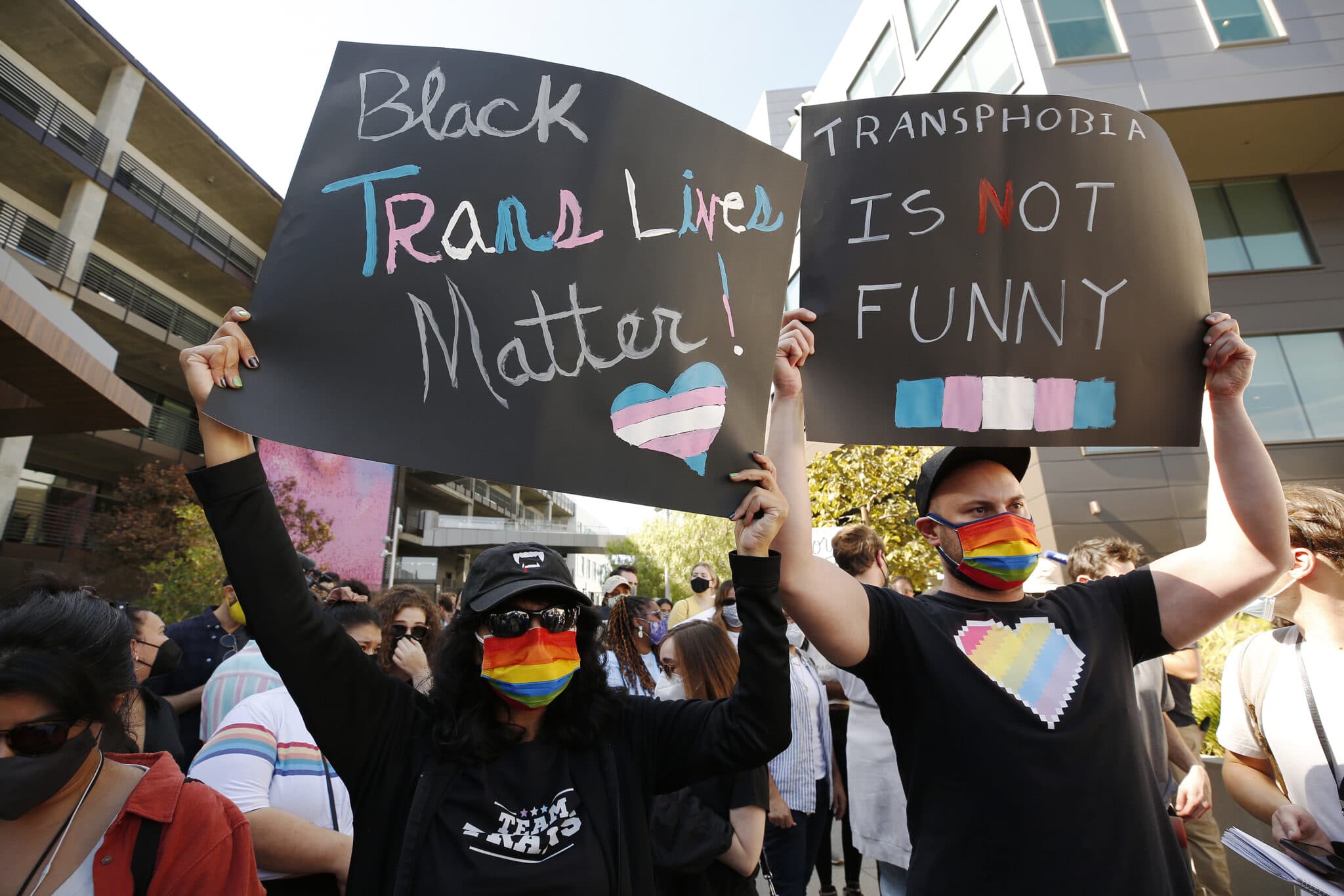
Netflix employees and supporters gathered at a protest outside Netflix. (Al Seib / Los Angeles Times via Getty Images).
Following weeks of criticism of homophobic and transphobic content in a Dave Chappelle comedy special, The Closer, streamed by Netflix, trans employees at the streaming giant organised a company-wide walkout.
Netflix employees who walked out, and supporters who joined them, were met by free speech and anti-trans counter-protestors. At the protest outside Netflix headquarters, B. Pagels-Minor, a Black non-binary former Netflix employee who was fired amid the company’s defence of Chappelle, read out the list of demands written by Netflix employees, including calling on the company to invest more money in trans and non-binary content and to support more trans and non-binary creators. The demands also included adding anti-trans content warnings to anti-trans shows on Netflix.
The walkout was supported by a number of celebrities and people who have worked with Netflix, including queer comedians Hannah Gadsby and Mae Martin, trans actor Elliot Page, and queer actor Jameela Jamil.
3. Multiple trans protests against the ‘transphobic’ BBC
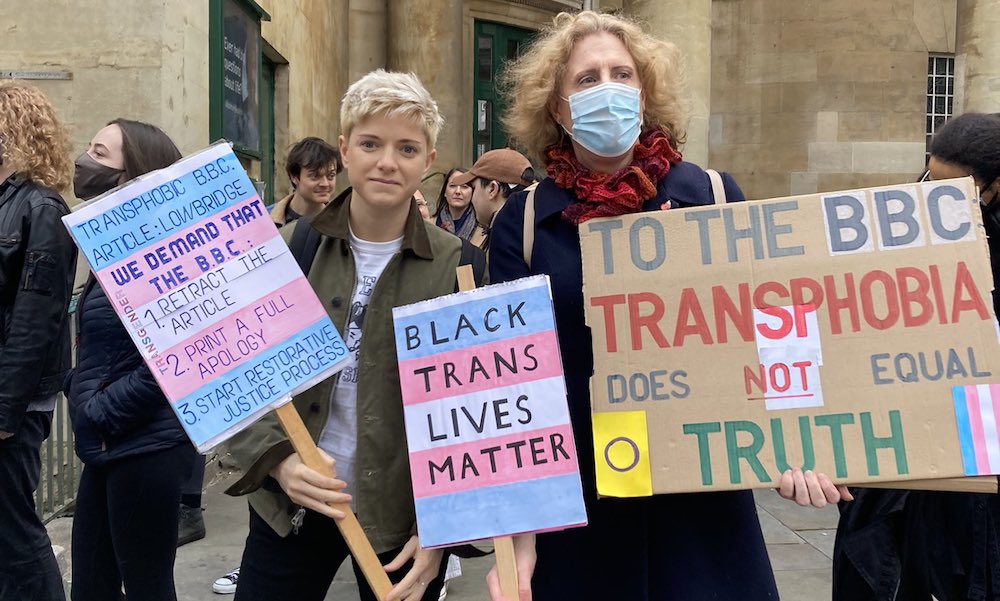
Mae Martin joined the protest outside Broadcasting House. (Twitter/ WhatTheTrans)
In November, protests broke out in several UK cities against a BBC article that claimed trans women were pressuring cisgender lesbians into sex. Demonstrations outside BBC offices in London (attended by non-binary comedian Mae Martin), Bristol, Cardiff, Manchester and Brighton came after more than 20,000 people signed an open letter to the senior management at the BBC.
The 26 October BBC News piece was titled “We’re being pressured into sex by some trans women” and has been widely condemned for using a self-selecting survey of 80 people who support an anti-trans campaign group to claim that trans lesbians are routinely pressuring cis lesbians into sex. The story initially platformed transphobic porn performer Lily Cade, before removing her. The BBC said it was a “complex” issue.
The UK’s public broadcaster has been regularly criticised for its coverage of trans people. Last year, senior MPs branded the BBC “institutionally transphobic“, while concern over the broadcaster’s stance continued this year when thousands condemned it for “uncritically platforming” anti-trans groups like the LGB Alliance and others said it is “censoring” trans issues.
4. Activists protest Hungary’s anti-LGBT law with giant rainbow heart
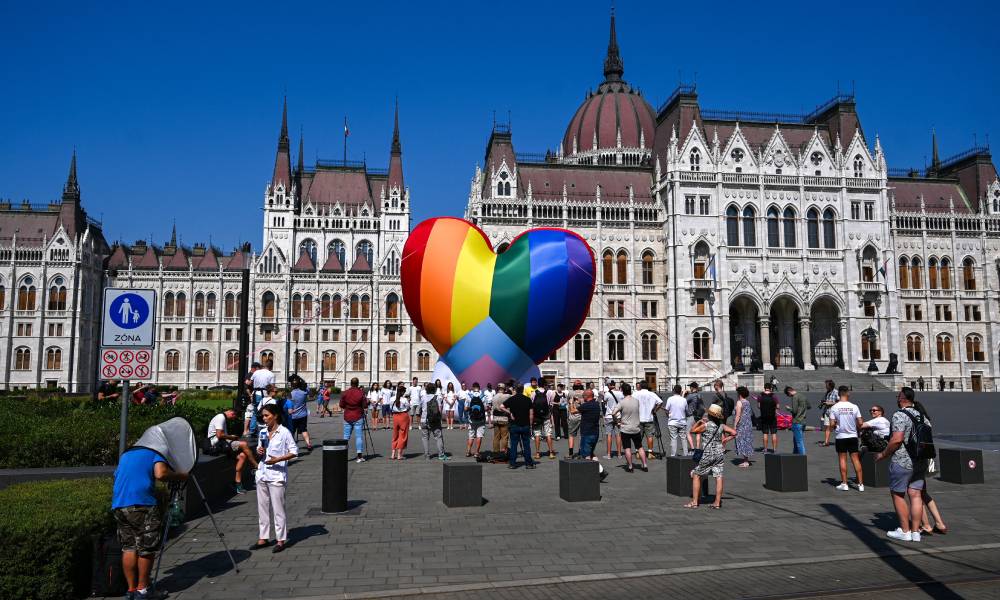
Activists fly a giant, rainbow heart balloon as they perform a flashmob in protest against a new anti-LGBT+ law in front of Hungary’s parliament on 8 July 2021. (Photo by ATTILA KISBENEDEK/AFP via Getty Images)
On 8 July, Hungary’s nationalist, dictatorial prime minister Viktor Orbán brought in a new anti-LGBT+ law. It has been compared to Russia’s anti-gay propaganda law, because it also bans the “promotion” of LGBT+ issues in schools, as well as establishing a government-approved list of sex-education providers in schools and banning any LGBT+ content in advertising or media which could be seen by minors.
The day that the law was brought in, trans and queer activists responded by flying a giant, rainbow balloon in front of Hungary’s parliament building in Budapest. Later that month, thousands of LGBT+ people and allies took to the streets to protest against the LGBT-phobic attacks by Hungarian politicians.
The new law is just the latest in a long series of attacks on LGBT+ rights in Hungary by Orban and his party Fidesz, from outlawing civil unions and same-sex adoption to ending legal recognition of trans people. LGBT+ activists told PinkNews that the new law “was the point where we understood the fact that we have rights… does not mean that [the government] cannot roll [them] back”.
5. Trans rights protest outside Downing Street
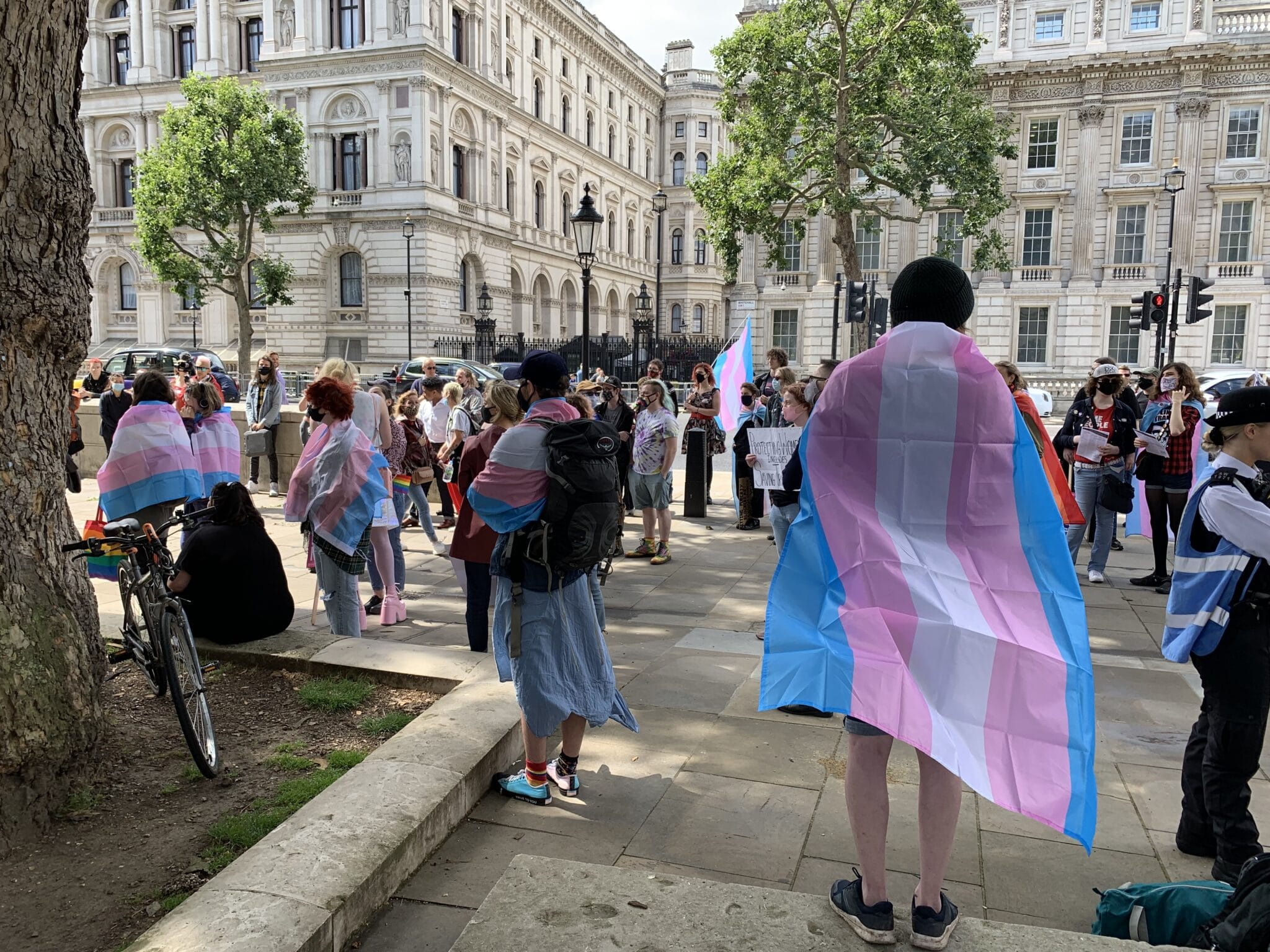
Protestors draped in trans Pride flags at the trans rights protest outside Downing Street in London. (Vic Parsons)
In August, trans and non-binary people responded to months of anti-trans rhetoric from the UK government by heading to Downing Street, the home and office of prime minister Boris Johnson.
Hundreds of people went to the trans rights protest, with attendees listening to almost three hours of speeches from activists, authors, poets, politicians and artists, which addressed both the material hardships facing British trans people today and what the government and community can do to tackle them.
The aims of the London trans rights protest, as set out by the organisers ahead of the event, included full reform of the Gender Recognition Act, legal recognition for non-binary people, the sacking of Tory equalities minister Liz Truss, a total overhaul of the failed trans healthcare system, protection for intersex people under the Equality Act and guaranteed access to free and timely healthcare for young trans people.
hi i’m vic parsons, @PinkNews’ gender & identity reporter, and i’m here today outside Downing Street for the trans rights protest. the sun has just come out and people are gathering with flags and placards pic.twitter.com/AZE54kxZMf
— PinkNews (@PinkNews) August 6, 2021
6. Students defend trans classmate with viral protest

Pupils at Berlin High School staged a walkout in solidarity with their transgender classmate (TikTok: ShaddiaGarza25)
After a young trans boy reported that he’d been cornered in the school bathroom by male classmates who allegedly demanded he pull down his pants and lift up his shirt, his peers staged a protest against his treatment outside the school in Berlin, Wisconsin.
The trans boy also said he’d been surrounded by classmates while trying to use the bathroom, who filmed him through a hole in the door. The police said no assault had taken place so, unsatisfied with this response, his classmates staged a viral walkout the following day.
One student explained to Action 2 News that “we wanted this to be public, we wanted people to see us, hear us”, while another said: “There’s been a big past of assault and homophobia in our school, and it just needs to come to an end.”
Students protest outside of Berlin High School in Berlin, WI after a 14-year-old transgender boy was cornered in the boy's bathroom by classmates who allegedly demanded he pull down his pants and lift up his shirt pic.twitter.com/DckbUMraoy— Gillian Branstetter (@GBBranstetter) November 9, 2021
7. Trans activists hunger strike over delay to gender law
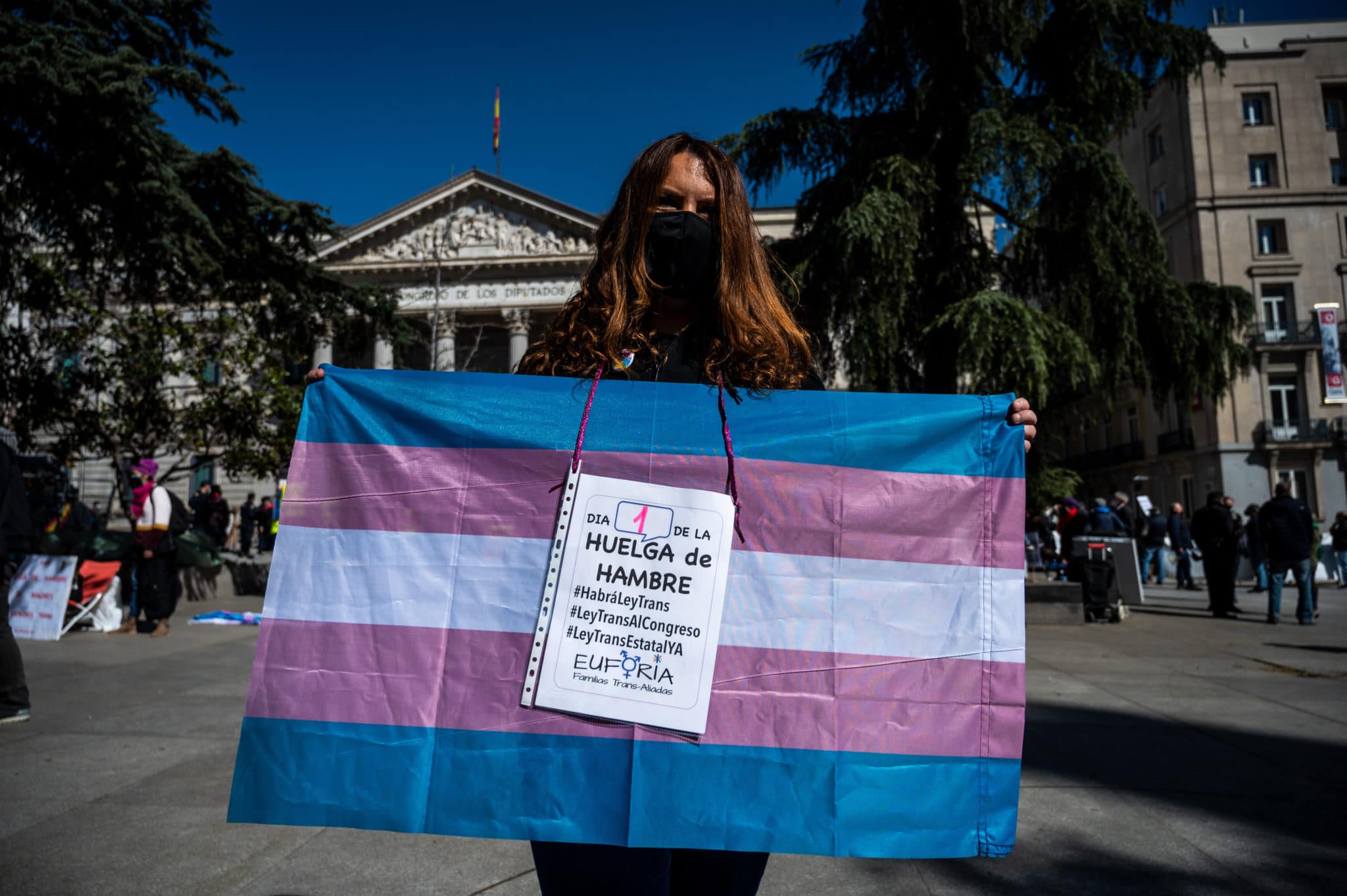
A protester showing a trans pride flag in front of the Congress of Deputies as a group start a hunger strike demanding a National Law for Transgender people. (Marcos del Mazo/LightRocket via Getty Images)
This year saw Spain finally bring in a law that will mean over-16s can change their legal name and gender on a self-determined basis, without the need for medical or psychiatric approval. The law, a draft version of which was finally passed by the government in June, experienced multiple setbacks and delays as “gender critical” campaigners in the country, learning from their contemporaries in places like the UK, used all their political power to try and prevent the bill from passing.
LGBT+ activists staged several protests about the “Trans Law”, with a March hunger strike by more than 70 trans civil rights campaigners helping to finally push the bill through.
“They are not going to put locks on freedom,” Mar Cambrollé, from Plataforma Trans, told ABC News. “We’re very clear about what we want. Self-determination with conditions on it isn’t self-determination.” Cambrollé earlier tweeted: “We continue in the fight and we will use all our body’s energy as a force for resistance. As we have always done! Until the end! Until we see the trans law go to congress!”
Día 2 de la #HuelgaDeHambreTrans seguimos en la lucha y pondremos la energía de nuestros cuerpos como fuerza de resistencia❗como hemos hecho siempre❗ hasta el final❗hasta ver #LeyTransAlCongreso #HabráLeyTrans pic.twitter.com/SdvRfO04rD— 🔻Mar Cambrollé 🏳️⚧️ Hay Ley Trans (@CambrolleMar) March 11, 2021

